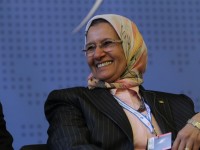 Commissioner for Infrastructure & Energy at the African Union Commission, H.E. Dr. Ibrahim has served in the academic research and electrical energy production for 33 years. As she’ll be keynoting at eLearning Africa 2016, we took the opportunity to catch up with her to discuss infrastructure, renewable energy and the future of African ICT.
Commissioner for Infrastructure & Energy at the African Union Commission, H.E. Dr. Ibrahim has served in the academic research and electrical energy production for 33 years. As she’ll be keynoting at eLearning Africa 2016, we took the opportunity to catch up with her to discuss infrastructure, renewable energy and the future of African ICT.
What effects does improved ICT infrastructure have on education?
H.E. Dr. Ibrahim: Policymakers widely accept that access to information and communication technology (ICT) in education can help individuals to compete in a global economy by creating a skilled work force and facilitating social mobility. They emphasise that ICT in education has a multiplier effect throughout the education system, by enhancing learning and providing students with new sets of skills; by reaching students with poor or no access (especially those in rural and remote regions); by facilitating and improving the training of teachers; and by minimising costs associated with the delivery of traditional instruction.
eLearning Africa: Can there be development in ICT infrastructure without development in the energy sector?
H.E. Dr. Ibrahim: No there can’t be. The importance of access to electricity to human development has been documented in a large number of case studies and cross-country econometric studies across regions.
The growth in electricity infrastructure and the resulting connectedness has been shown to be an immensely important factor governing the growth of ICT.
eLearning Africa: Does the future of African ICT lie in developing traditional networks or in using innovative technologies?
H.E. Dr. Ibrahim: Both are needed. While the development of traditional networks is needed to cover all areas, we also have to accompany the industrial society that has moved into an era of advanced technological innovation, affecting the way developed countries run their businesses, their institutions and lead their lives. One of the areas in which these technological advances are dramatically influencing people’s lives is information technology and telecommunications – hence the claim that we are in the midst of a ‘digital revolution’ that is driving us towards an ‘information society’.
eLearning Africa: How important will renewable energy be for Africa’s future?
H.E. Dr. Ibrahim: Renewable energy is a natural choice for Africa given its vast available renewable energy resources. The Sun Belt covers most of Africa, oceans & seas surround the whole continent and over 80% of respondents in a survey cited Africa’s wind and solar resources as a strong driver for renewables deployment. Renewable energy is also attractive especially in Africa, as it is relatively quick and cheap to deploy on a small scale in remote areas compared with fossil fuels or expansion of networks.
eLearning Africa: How important is cooperation between African countries for infrastructure development?
H.E. Dr. Ibrahim: A review of infrastructure-sharing experiences found that developing countries can save billions and speed universal broadband access by sharing infrastructure.
These savings can be obtained both through sharing telecom infrastructure (such as ducts, fibers and masts) as well as sharing with other utility infrastructure such as roads, power grids, fuel pipelines and rail lines.
The Program for Infrastructure Development in Africa (PIDA) provides a common framework for African stakeholders to build the infrastructure necessary for more integrated transport, energy, ICT and trans-boundary water networks to boost trade, spark growth and create jobs. PIDA will allow countries to be the primary beneficiaries to meet forecast demand for infrastructure services and boost their competitiveness by:
- Increasing efficiencies
- Accelerating growth
- Facilitating integration in the world economy
- Improving living standards
- Unleashing intra-African trade
eLearning Africa: What do you hope to achieve through your work at the African Union?
H.E. Dr. Ibrahim: I have been working for the African Union for 8 years, where our team at the department of Infrastructure & Energy is working very hard to develop and implement policies and programmes aiming at achieving the AU vision of “an integrated, united, developed and prosperous Africa, people-driven and an influential global player and partner”. In the ICT sector we are looking for:
- Provision of affordable broadband access to African citizens;
- Promoting the Digital Agenda in Africa thereby transforming socio-economic development sectors;
Integrated, efficient and affordable infrastructure
Do not miss H.E. Dr Elham Mahmood Ahmed Ibrahim’s keynote speech at the eLearning Africa opening plenary on May 24.


















